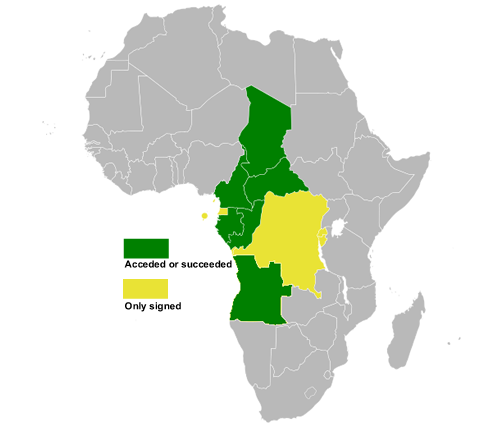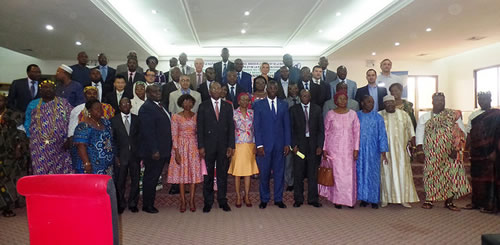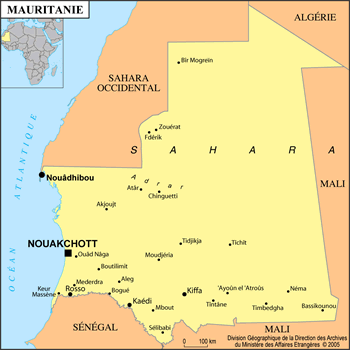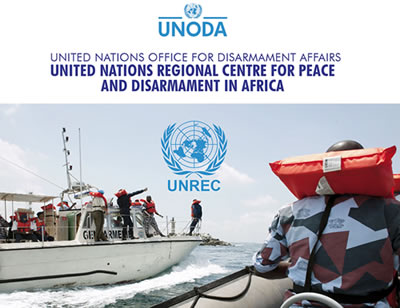 The conditions for the entry into force of the Kinshasa Convention were met following the deposit of the sixth instrument of ratification by Angola on 6 February 2017. In accordance with its article 35, paragraph 1, the Convention shall therefore enter into force on 8th March 2017 (“30 days after the date of deposit of the sixth instrument of ratification, acceptance, approval or accession”).
The conditions for the entry into force of the Kinshasa Convention were met following the deposit of the sixth instrument of ratification by Angola on 6 February 2017. In accordance with its article 35, paragraph 1, the Convention shall therefore enter into force on 8th March 2017 (“30 days after the date of deposit of the sixth instrument of ratification, acceptance, approval or accession”).
Adopted on 30 April 2010, six out of the eleven signatories namely Cameroon, Central African Republic, Chad, Congo and Gabon are parties to the Kinshasa Convention
The Convention sets out specific obligations on a wide range of issues related to the control of SALW, their ammunition, parts and components, including: International transfers; Civilian possession; Manufacture, distribution and repair; Brokering; Marking and tracing; Registration collection and destruction; Management and Security of Stockpiles; Border control; Transparency and exchange of information.
Thus, the Kinshasa Convention will complement and reinforce other disarmament and arms control instruments and frameworks applicable to the United Nations Standing Advisory Committee on Security Questions in Central Africa (UNSAC) countries, such as the Arms Trade Treaty, the Firearms Protocol, the United Nations Programme of Action, the International Tracing Instrument, the Bamako Declaration and the African Union Strategy on the Control of Illicit Proliferation, Circulation and Trafficking of SALW.
Effective implementation of the Kinshasa Convention will contribute to reducing the illicit trafficking and proliferation of arms in the region and beyond, thereby fostering the advancement of Goals 16.a and 16.4 of the Sustainable Development Goals. The latter calls for the reduction of illicit arms flows and the strengthening of relevant national institutions. At the regional level, the implementation of the Kinshasa Convention will also contribute to the African Union’s aspiration of ‘Silencing the Guns’ by the year 2020 as called for in Agenda 2063.
Mandated by UNSAC to elaborate the initial draft of the Convention, in 2014 UNREC also supported ECCAS countries in developing a draft harmonisation guide in preparation for the future implementation of the Kinshasa Convention, detailing concrete steps and actions which are required to meet the new responsibilities.
The entry into force of the Kinshasa Convention will greatly enhance the legal disarmament and arms control framework of the African continent, adding a fourth legally binding, sub-regional instrument to the existing ECOWAS Convention, Nairobi Protocol and SADC Protocol.
UNREC calls for further universalisation of the Kinshasa Convention, as well as for its swift and effective implementation, guided by the proposals contained in the relevant implementation plan.
For more information, please contact: UNREC, Tel: (+ 228) 22535000 E-mail: Cette adresse e-mail est protégée contre les robots spammeurs. Vous devez activer le JavaScript pour la visualiser. www.unrec.org, www.facebook.unrec.org, twitter.com/odaunrec
 On 18 May 2017, the United Nations Regional Centre for Peace and Disarmament in Africa (UNREC), together with the Government of the Republic of Togo, launched a project to support the Government’s efforts in marking, rehabilitation of stores and destruction of obsolete weapons and ammunition.
On 18 May 2017, the United Nations Regional Centre for Peace and Disarmament in Africa (UNREC), together with the Government of the Republic of Togo, launched a project to support the Government’s efforts in marking, rehabilitation of stores and destruction of obsolete weapons and ammunition. Who we are
Who we are  Newsletter/UNREC Focus
Newsletter/UNREC Focus  Contact Us
Contact Us  Overview
Overview  Specific Projects
Specific Projects  Calendar of Events
Calendar of Events  Useful Links
Useful Links  Employment
Employment  Rosters of Experts
Rosters of Experts  Internships
Internships 
 The United Nations Regional Centre for Peace and Disarmament in Africa (UNREC), in collaboration with the Mauritanian national authorities, organizes a workshop on “Physical Security and Stockpile Management procedures” to be held from on 25th -26th April 2017. The event will take place in Nouakchott, Islamic Republic of Mauritania at the Monotel hotel Dar El Bakar.
The United Nations Regional Centre for Peace and Disarmament in Africa (UNREC), in collaboration with the Mauritanian national authorities, organizes a workshop on “Physical Security and Stockpile Management procedures” to be held from on 25th -26th April 2017. The event will take place in Nouakchott, Islamic Republic of Mauritania at the Monotel hotel Dar El Bakar. Formerly restricted mainly to North Africa, violent Islamic extremism now forms a strategic African continuum from West to East, with the Sahelian zone and the Lake Chad Basin emerging as prime areas. This extremist violence is fueled by the continuing inflows of foreign terrorist fighters (FTF).
Formerly restricted mainly to North Africa, violent Islamic extremism now forms a strategic African continuum from West to East, with the Sahelian zone and the Lake Chad Basin emerging as prime areas. This extremist violence is fueled by the continuing inflows of foreign terrorist fighters (FTF). The conditions for the entry into force of the Kinshasa Convention were met following the deposit of the sixth instrument of ratification by Angola on 6 February 2017.
The conditions for the entry into force of the Kinshasa Convention were met following the deposit of the sixth instrument of ratification by Angola on 6 February 2017. 
 The United Nations Regional Centre for Peace and Disarmament in Africa (UNREC) will host a Regional Workshop on Physical Security and Stockpile Management from 15 – 17 November 2016, in Lome Togo. The workshop will take place at the hotel Sarakawa.
The United Nations Regional Centre for Peace and Disarmament in Africa (UNREC) will host a Regional Workshop on Physical Security and Stockpile Management from 15 – 17 November 2016, in Lome Togo. The workshop will take place at the hotel Sarakawa. Paper prepared by UNREC as a contribution to the emerging discourse on enhancing maritime security in Africa, gives an overview of the overall challenge, conceptual definitions and international instruments relevant to maritime security in Africa .
Paper prepared by UNREC as a contribution to the emerging discourse on enhancing maritime security in Africa, gives an overview of the overall challenge, conceptual definitions and international instruments relevant to maritime security in Africa .  Within the framework of its ongoing work to address the Illicit Trade in Small Arms and Light Weapons in Africa,
Within the framework of its ongoing work to address the Illicit Trade in Small Arms and Light Weapons in Africa,